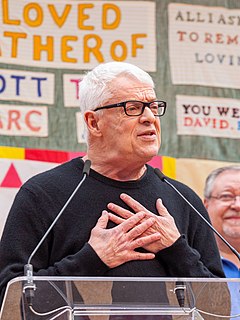A Quote by Joyce Carol Oates
We are stimulated to emotional response, not by works that confirm our sense of the world, but by works that challenge it.
Related Quotes
Grace stands in direct opposition to any supposed worthiness on our part. To say it another way: Grace and works are mutually exclusive. As Paul said in Romans 11:6, "And if by grace, then it is no longer by works; if it were, grace would no longer be grace." Our relationship with God is based on either works or grace. There is never a works-plus-grace relationship with Him.
The way my brain works, it created me thirsty. From the off, I was a sponge for information that had emotional connotations, I think that was it. I was brought up to see the world as emotional, and anything that I could get my hands on that helped me explore that emotional stuff, I was fascinated by.
We have a system which, though far from perfect, is strong with idealism. It gives elbow room for men of all races and all beliefs. It is vital and dynamic. And it works. We have the means of shaping the world in our pattern. If we do, freedom will be assured for all men. The decision is in the hands of this generation. It is a challenge to our political competence. For Western civilization it is the greatest challenge of all time.
Many consider that Shostakovich is the greatest 20th-century composer. In his 15 symphonies, 15 quartets, and in other works he demonstrated mastery of the largest and most challenging forms with music of great emotional power and technical invention...All his works are marked by emotional extremes - tragic intensity, grotesque and bizarre wit, humour, parody, and savage sarcasm.
Spoken forgiveness, no matter how heartfelt, works best when we do not demand the response we want. I mean that when we tell people we forgive them, we must leave them free to respond to our good news however they are inclined. If the response is not what we hoped for, we can go home and enjoy our own healing in private.
Perhaps randomness is not merely an adequate description for complex causes that we cannot specify. Perhaps the world really works this way, and many events are uncaused in any conventional sense of the word. Perhaps our gut feeling that it cannot be so reflects only our hopes and prejudices, our desperate striving to make sense of a complex and confusing world, and not the ways of nature.






































